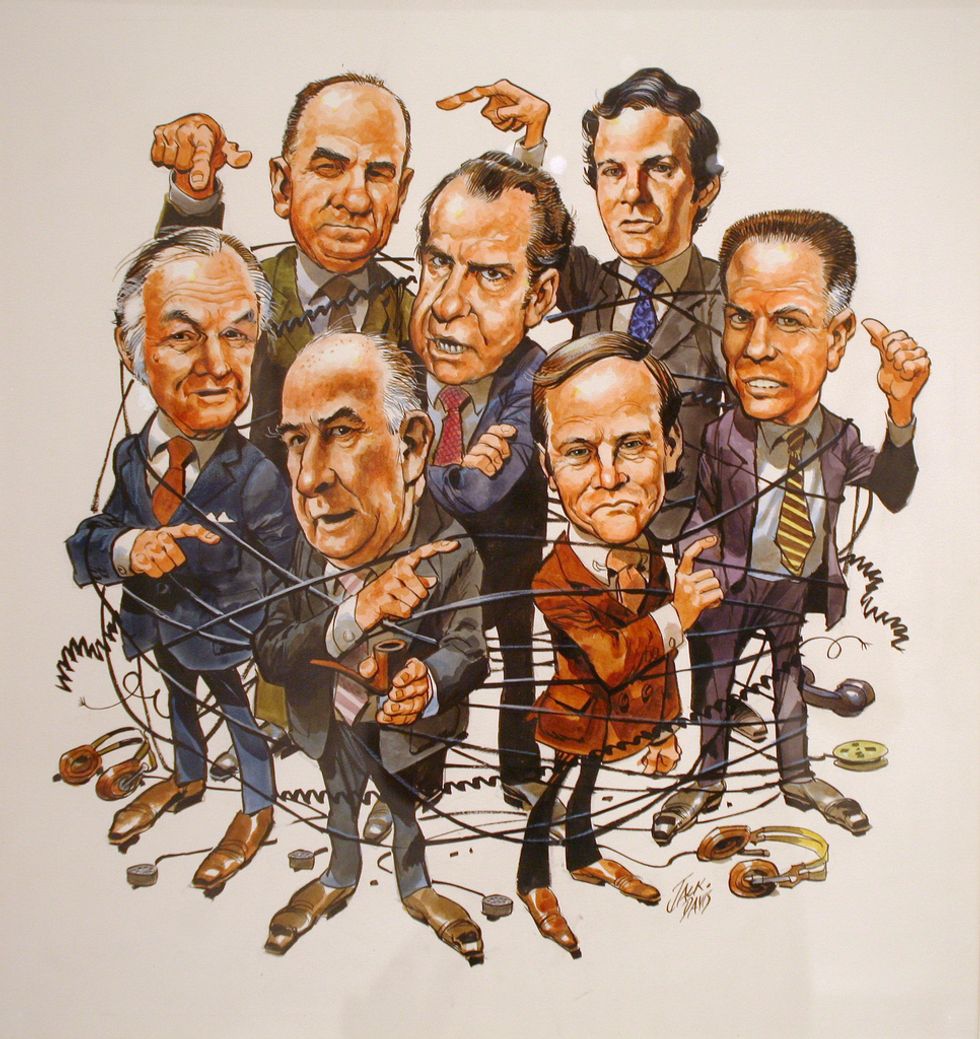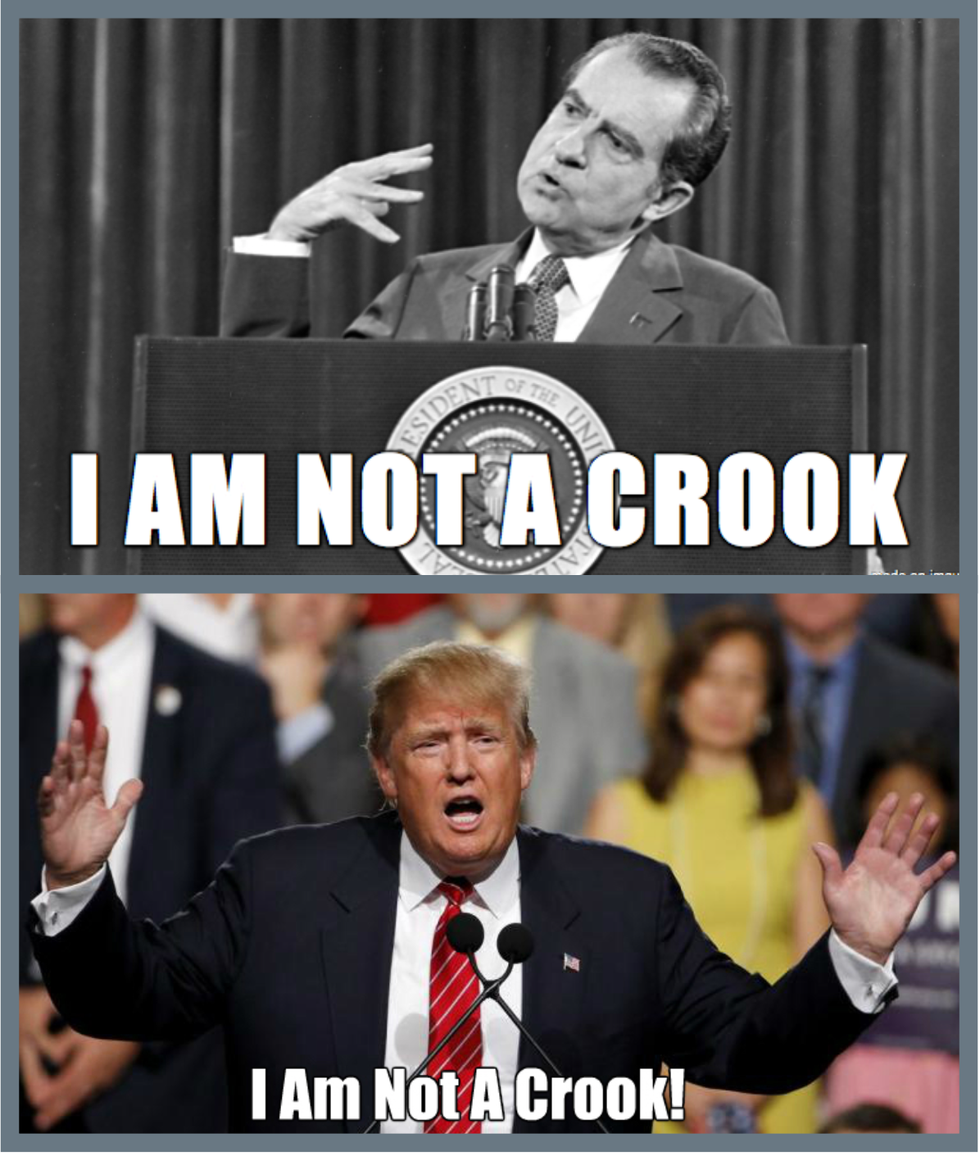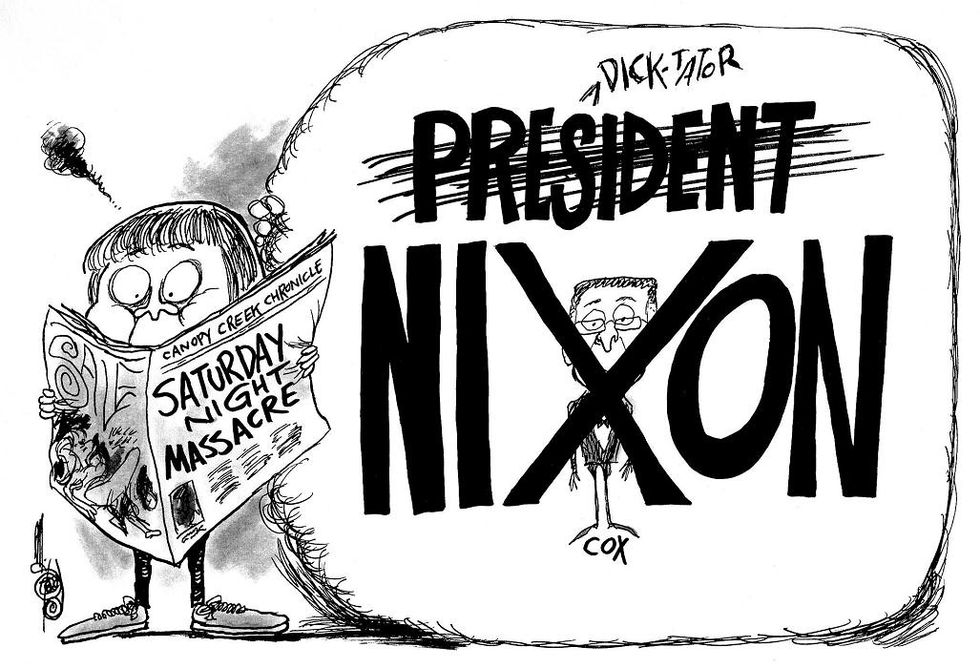Unless you've been living under a rock, you're probably aware that Donald Trump has had better weeks. It's not often that Congress members begin throwing the "i-word" around, especially when the President has yet to complete 1/16th of his term. Yet here we are.
John McCain recently told the press that the Trump turmoil has reached the point of equaling -- or even surpassing -- Watergate, joining a chorus of countless pundits. That's a pretty bold claim -- comparing current events to the scandal so big it inspired people to label countless controversies as "––––– gate." But how valid is that comparison, really? Very few of us could recount the original scandal if held at gunpoint, and fewer still could grasp the implications of McCain's comparison without a point of reference. What was Watergate, and can "Trumpgate" truly compare? Buckle up -- it's going to be a wild ride.
PART I: THE BUNGLED BURGLARY
June 17, 1972. A group of 5 burglars infiltrate the Democratic National Convention HQ located in Washington’s Watergate office complex. Their mission? Repair malfunctioning wiretaps they installed during an earlier May break-in and nab top-secret documents. Due to some rather sloppy handiwork (turns out taping down door locks gives your presence away immediately - who knew?), the group was caught by security guard Frank Wills and promptly arrested.
The timing couldn’t have been more suspicious. The 1972 Presidential Election was only five months away, and increasing volatility over the Vietnam War made Nixon’s reelection far from certain. Public approval had always been touch-and-go throughout his political career, and was currently on a downswing. Further complicating matters was the lack of front-runner for the Democratic nomination; Nixon had already lost one presidential election (against JFK in 1960) and barely won another (against Hubert Humphrey in 1968). If Humphrey secured the Democratic nom (as many predicted), Nixon could easily lose again.
In a delicious twist of irony, DNC meddling led to the wildly unpopular George McGovern receiving the nomination (where have I heard this before?). But Nixon had no time to celebrate such a fortuitous turn of events. Evidence seized by detectives showed a possible link between the burglars and intelligence officer E. Howard Hunt, who in turn was a member of the less-than-legal Committee for the Re-Election of the President (CREEP -- a most appropriate acronym). Nixon continually denied the involvement of any White House staff, much less himself. A “money trail” which implicated both CREEP and Attorney General John Mitchell in the burglary, however, suggested otherwise.
That one-two punch of campaign-derailing revelations came about just weeks before the election, but it failed to dissuade the majority (of Electoral College votes). When faced with choosing between a Republican whose questionable ethics alluded to possible election tampering and a Democrat whose views/persona failed to resonate with a significant chunk of the party, a groundswell of blue-collar support led to the election of the Republican.
Am I talking about Nixon v. McGovern, or Trump v. Clinton? 1
PART II: SAVING FACE ON SATURDAY NIGHTS
Of course, the efforts of the media to uncover the truth were far from over. Led by the now-legendary efforts of Bob Woodward and Carl Bernstein and their primary informant, then-FBI associate director Mark “Deep Throat” Felt, news outlets uncovered more and more layers in an ever-deepening web of treachery. It's during this period that the parallels between Watergate and Trumpgate are most keenly evident: dismissing an FBI director who knew too much ("Deep Throat" for Nixon, Comey for Trump), approval ratings nosediving, a parade of staff dismissals and disgraced exits, sacrificing key advisors to save face, all while the President continues to claim he is the victim of a witch hunt...
...and most certainly “not a crook”...
... and clearly isn't hiding anything despite repeated refusal to turn over subpoenaed evidence2
Everything came to a head on October 20, 1973: the "Saturday Night Massacre"3
. In a stunning display of despotism Nixon fired independent special prosecutor Archibald Cox after the latter flew too close to the truth; rather than carry out Nixon's demand Attorney General Elliot Richardson and Deputy Attorney General William Ruckelshaus resigned in protest. It was Cox who first determined Nixon possessed key evidence in the form of tapes and transcripts of phone conversations, and his refusal to withdraw subpoena orders made him too dangerous for Nixon to keep around. Public blowback was fierce, and federal courts found Cox's dismissal illegal within a month of the incident.
PART III: FALLOUT
The Saturday Night Massacre proved to be the last straw for Congress, and their immediate impeachment discussions illuminate a key difference between Watergate and Trumpgate: Democrats held majority in both the House and Senate circa 1972. When coupled with a less rigidly bipartisan environment, this made it far easier to get motions to pass, which in turn put more pressure on Nixon. It's difficult to imagine Congress doing the same for Trumpgate; unless something drastic transpires which causes majority-holding Republicans to abandon ship, we likely won't see any earnest attempts at impeachment until the Democrats regain majority in the 2018 midterms.
But back to our history lesson, because we're getting to the best part: the tapes!4
Nixon was adamant that investigators didn't get ahold of tapes containing phone conversations between him and various higher-ups in his administration, going so far as to exercise executive power to keep them out of the FBI's grabby little hands. He eventually (and very reluctantly) agreed to compromise by offering transcripts of the tapes' contents -- edited, of course, to ensure information that could compromise the government remained confidential.
Turns out that was a Very Bad Move™. In July 1974 the Supreme Court declared Nixon obstructed justice and abused executive powers by meddling with the release of the tapes (and erasing significant chunks from them), which finally (finally!!) gave Congress grounds to begin impeachment proceedings for real. Forced to choose between a guilty verdict or leaving the Oval Office in disgrace, Nixon chose the latter. On August 8, 1974 he became the first (and so far only President) to resign from office, bringing the Watergate saga to a subdued end.
Nixon's successor Gerald Ford granted a presidential pardon to his former boss exactly one month later, on September 8, 1974; this officially cleared Nixon of any wrongdoing in the eyes of the law. It did not, however, clear his name in the eyes of the people, and his death in 1994 did little to quell public disdain. To this day, whatever Richard Nixon accomplished during his tenure has been all but forgotten, his legacy forever tarnished by Watergate.
So why does all of this matter? It's actually rather simple: Our present is simply a remixing of our collective past -- comprehend what factors led to events in the latter, and you gain greater insight into the former. If we're to emerge from this mess of a presidency in one piece, we must put things into perspective; understand that there is an historical precedent for what we're seeing, much like there was an historical precedent for Trump's chaotic cabinet. We need to remain resolute and push for justice so our democratic institutions remain unscathed; only through bipartisan collaboration was Nixon's treachery undone, and the same holds for Trump and whatever he's trying to hide. And no matter how much Trump and co. plug their ears and deny, deny, deny, they can never hope to claim victory against those who champion the truth.
Is Trumpgate worse than Watergate? It very well could be. But I'd prefer to leave you with these words from Archibald Cox, which remain chillingly prudent nearly half a century later: "Whether we shall continue to be a Governmeat of laws and pot of men is now for Congress and ultimately the American people [to decide]".
1. A more apt comparison may actually be Nixon v. McGovern and a hypothetical Trump v. Sanders, as the Democrats in both scenarios were progressives with radical solutions to issues like minimum wage. Of course, there’s a few key differences: for one, Trump lost the popular vote by a fairly significant margin, while Nixon won by one of the biggest landslides in election history. Two, Clinton (and Sanders, hypothetically) both had something McGovern lacked - a fighting chance and enough supporters to win the popular vote.↩
2. OK, so Trump hasn't done this yet, but he probably will have by the time you read this because nothing is sacred nor makes a lick of sense these days.↩
3. Not to be confused with the Saturday Night Live Massacre Trump must endure on a weekly basis. Lord knows if he'd be able to explain (let alone comprehend) the difference, though.↩
4. Which, unlike Hillary's emails, actually PROVED something.↩

























